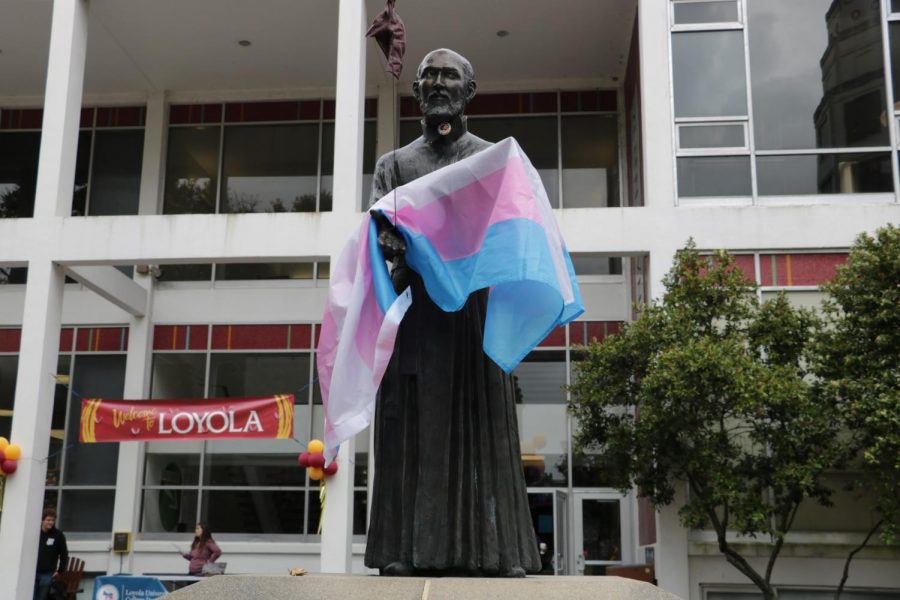Editorial: We all must continue to support the trans community
March 31, 2020
It’s no secret that nonbinary and non-cisgender people have a long history of mistreatment by institutions, the law and society in general. And unfortunately, we still have a long way to go before we live in a world that allows the nonbinary and non-cisgender community to just be themselves.
Every day, transgender and intersex people are physically and verbally bullied across the country, and along with society’s fair share of victim-blaming, that leads to a lot of justified feelings of shame.
Thankfully, Loyola has been taking the right steps in becoming a more trans-positive university. Some professors are becoming more conscious about gender identity by asking for students’ preferred pronouns at the beginning of the year; the Office of Student Affairs is putting these professors through multiple rounds of gender identity sensitivity training; and starting this summer Blackboard will begin allowing students to list their pronouns and preferred names on class rosters. That’s a big deal.
Compared to other school systems in the South, Loyola is an extremely queer-conscious university. But even with the successes we’ve won here, it’s critical to remember that we can still do more to reach out to the nonbinary and non-cisgender community at Loyola.
For example, SGA required student leaders to attend organization summits that teach clubs and organizations about sexual assault awareness, alcohol safety and anti-hazing laws in order to receive funding for their programs. While this awareness training is obviously important, gender identity awareness and sensitivity training is just as necessary for these clubs and organizations’ members’ well-being.
That being said, Loyola and liberal college campuses in general are some of the most trans-positive environments you can find in America. There is a drastic difference in perception of the nonbinary and non-cisgender community between Loyola and the rest of New Orleans. Take it one step further, and you’ll find an even more substantial drop-off in positive attitudes toward this community between New Orleans and the rest of the South.
That’s because even when Loyola falls short of being totally inclusive to the nonbinary and non-cisgender community, we understand that it isn’t without a lack of trying. There is a very real effort among the student body and members of faculty and staff to actually learn and understand these seemingly “new-age” (though we acknowledge that trans people have existed forever — with or without society’s approval) perspectives on gender identity, and be fully inclusive to transgender and intersex people.
And while there are obviously those among the faculty and student body who don’t make that same effort to understand and thus come off as, at best, ignorant, and at worst, transphobic, Loyola is taking the right steps toward being as trans-positive and accepting as possible.
And what that means is that we have to look beyond how we can make the “already good” better and bring about change outside our Loyola bubble too.
Because the tragic truth is this: outside of this bubble, there are people who will spew hate just because of one’s gender identity. The alarming suicide statistics for trans youth prove there are people in these communities who would rather die than face the constant physical and verbal harassment of the outside world. The rest of us owe it to our friends to create a world that cherishes them, protects them and celebrates them.
Bringing about change shouldn’t extend to just your immediate surroundings. That change can come in the form of advocating for bills that protect LGBTQ+ youths from discrimination or conversion therapy, advocating for better access to mental health care for the LGBTQ+ community or even just starting a dialogue and learning more about the nuances of gender identity.
People in the transgender community have been fighting against transphobia and institutional mistreatment for a long time, so it’s up to us to do the right thing and join the fight.









Luisa Derouen • Apr 7, 2020 at 10:09 am
Thank you, JC, for this column. I am a Catholic sister and for the past 21 years I have been ministering among the trans community across the country as a spiritual companion, ally and advocate. I lived in New Orleans until Katrina and attended Mass and many lectures at Loyola.
You are so right to say that we are making progress but we have a very long way to go to respect our gender expansive friends and family.
Keep it up!
Sister Luisa Derouen, O.P.